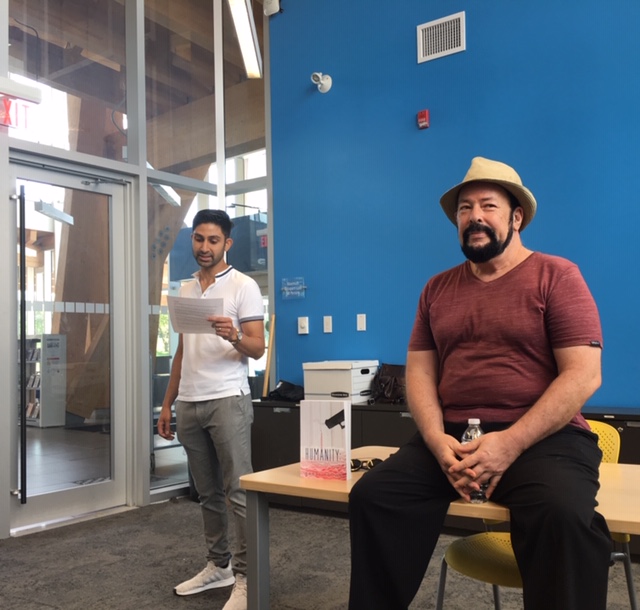BY STAFF REPORTER, TORONTO:

Ancient India’s history ends almost 6,000 years ago with the destruction of its ancient kingdoms and the War of Kurukshetra is the first large-scale, organized war in human history. This, according to a new book entitled Humanity – The World before Religion, War and Inequality by Canadian author and journalist Barry Brown, who was speaking earlier last week to audiences at the Toronto public library. In an event organized by the Centre for Inquiry Canada (CFIC), Brown says the first war in the world was the epic Battle of Kurukshetra as described in the Mahabharata where four million warriors died.
And that war is also the historic event that inspired the Bible’s tale of the ‘fall of mankind’ in the Garden of Eden and the beginning of the Jewish calendar nearly 6,000 years ago, said the Pulitzer Prize-nominated Canadian journalist who wrote his book after several years of research.
“Barry Brown is a Pulitzer prize nominated journalist who has written over 3000 articles for the Washington Times, New York Times and other prestigious publications,” said Rohit Mohindra, executive director of CFIC, introducing the author to the audience.
Inspired by a quote by Greek philosopher Aristotle who said ‘the Jewish people are descended from the Brahman priests of India’, Brown decided to investigate and research this concept.
“It turns out, he was right,” says Brown, describing the genetic family ties between the Jewish ‘Levites’ – the tribe of born Jewish priests – and several families of Hindu Brahmins including the Yadava clan that the Mahabharata says fought in the 6,000 year old war.
“Modern genetic science has traced these family ties through the Ancient Israelites and their line of born priests called the Levites. Like India’s Brahmins, the Levites are Jewish priests identified by their ancient family ties to the family of Moses and his brother Aaron (c 1300 BC). A 2003 chromosome study of the R1a1a Haplogroup found multiple origins for the family of European Levites including one line that is uncommon among Middle Eastern Jews but in over 70% of the West Bengal Brahmins,” he says.
Brown also illustrated his theory that the fall of the Indus River Valley Civilization came after the war and not before, as is generally believed.
“This story refers to a period of worldwide climate change and the end of India’s Indus River Valley Civilization. The local people of Mesopotamia called these homeless Indo-Semitic people the ‘Hebrews. The word ‘Hebrew’ means “homeless wanderers from the East and these people are first identified after the Biblical characters of Noah and his followers are forced to abandon their unidentified homeland for the Middle East and Northeast Africa around 2000 BC.”
The author also quoted the Jewish Bible that says Eden was located at the eastern end of a larger land called “Havilah”.
“According to the 20-volume, 1906 Jewish Encyclopedia, the oldest traditions in Judaism and Christianity dating back more than 2,000 years all agree Havilah was India,” said Brown.
After the war story, the record of India’s ancient history is lost for 2,500 years until the arrival of the Buddha around 600 BC, so this revelation of what happened after the war is ‘very exciting,’ says Brown.
The two hour session concluded with a Q&A by audience members followed by a book signing.
Brown also said that members of the Jewish, Christian and Muslim communities have also praised Humanity.
“I don’t know if you’re right but you’ll change history if you are,” Yaen Vered, Canadian Representative Israeli Antiquities Authority.
“Barry, you’ve discovered the Rosetta Stone for understanding early Biblical history,” Rev. John J. Mastandrea, Metropolitan United Church, Toronto.

